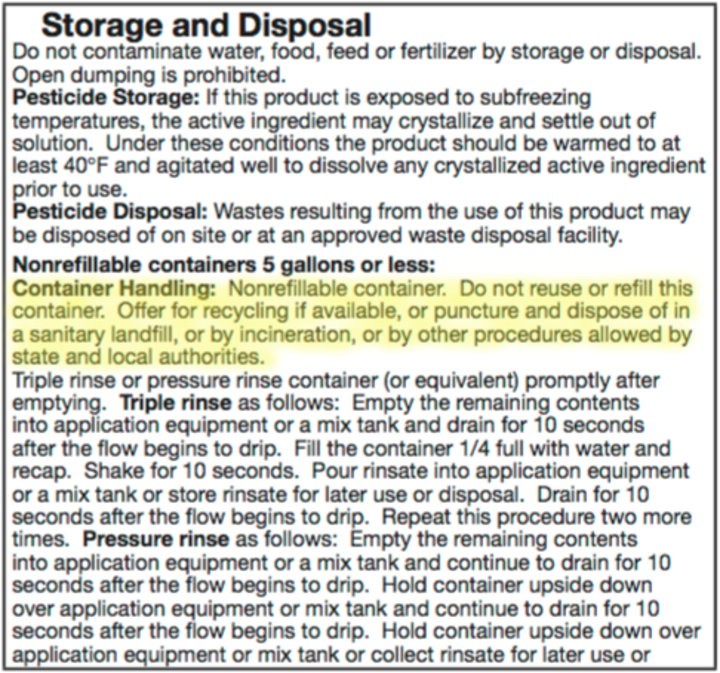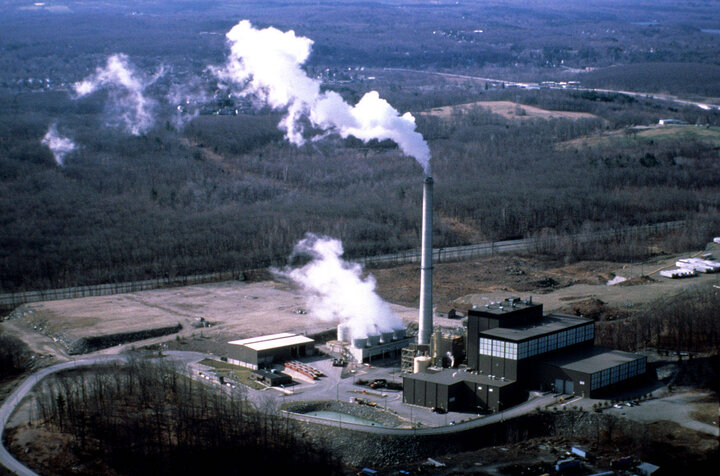Properly disposing of empty pesticide containers is an important but often overlooked aspect of safe pesticide use. The Pesticide Safety Education Program sometimes receives questions about whether it is permissible to burn these containers. This page discusses alternative disposal options, pesticide label language related to container disposal, the legality of open burning, the difference between open burning and incineration, and safety considerations.
Options to Weigh First
When disposing of empty pesticide containers, consider these preferred disposal options first:
- Recycle the containers, or
- Take the containers to a landfill that accepts them.
Label Language
Pesticide product labels include directions for disposing of the pesticide itself and its container. It is illegal to burn a pesticide container if the pesticide product label does not allow it. However, label language can sometimes be difficult to interpret. Below are two examples of label language related to container disposal, accompanied by some interpretation.
| Product Label | Label Statement | What It Means |
|---|---|---|
| Product Label 1 | “…dispose of [container] in a sanitary landfill, or by incineration, or, if allowed by state and local authorities, by burning. If burned, stay out of smoke.” | Note that the label treats incineration and “burning” (i.e., open burning) as different actions. While incinerating this container would be allowed, open burning of this container would only be permissible if state and local rules allow such an activity. |
| Product Label 2 | “…dispose of [container] in trash or in a sanitary landfill or by incineration.” | This label does not include “burning” as a container disposal option, even if allowed by local authorities. It would be illegal to dispose of this container by open burning. |

Burning vs. Incinerating: What's the Difference?
Why do pesticide labels make a distinction between burning and incineration? Because they are two very different processes:
- Incineration involves destroying materials at very high temperatures for a specific period of time, depending on the material. Incinerators are useful for destroying hazardous waste: They can reach up to 2,500° F and usually filter any smoke, debris, or fumes created by the incineration process to prevent it from entering the environment unprocessed.
- Open burning, such as in an outdoor burn barrel, occurs at temperatures far lower than those present in an incinerator. Lower burning temparatures are less effective at destroying hazardous materials. In addition, burn barrels/pits do not filter contaminants being released into the air, making these techniques more hazardous to your health and the environment. Although it is banned in most states, Nebraska law includes avenues for legal open burning.

There is only one hazardous waste incinerator in Nebraska (in Kimball). The limited availability of incineration services means it is not a viable container disposal option for most Nebraskans.
Open Burning in Nebraska
Laws and ordinances related to open burning vary depnding on the specific county or municipality within Nebraska.
Generally, you must acquire two permits to perform an open burn:
- a permit from the local fire authorities, and
- a permit from the Nebraska Department of Water, Energy, and Environment (NDWEE).
However, NDWEE Form #: 07-279 states that a permit from the NDWEE is not necessary to burn “agriculturally related materials that are potentially hazardous and where disposal by burning is recommended by the manufacturer,” including empty agricultural pesticide containers, as long as the fire does not cause a “public nuisance or traffic hazard.” Note that this permit exemption does not apply to containers of pesticides used for nonagricultural purposes.
Best practice: You should always talk to your local fire department before conducting an open burn. They can issue you a permit and help clear up any legal uncertainty. The fire department can also advise you on environmental conditions and safety.
Other Considerations
Pesticide container burning must occur on the property where the product was applied and must be performed by the owner of that property. This means that co-ops and other groups cannot collect containers and burn them.
Be aware of your surroundings—open burning has the potential to be a nuisance to others. Use a screen to prevent the spread of embers. Burning can pose health and environmental hazards due to fumes from burning plastic, pesticide residue, etc. Reduce the risk of these problems by ensuring the containers are completely emptied and properly rinsed prior to burning.